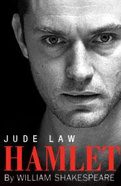Hamlet Star Jude Law on Gossip, Good Looks and His Greatest Role

Jude Law is not just a pretty face. The two-time Oscar nominee (he garnered nods for his work in both The Talented Mr. Ripley and Cold Mountain) is an accomplished stage actor, who received a Tony nomination for his Broadway debut in Indiscretions in 1995. After establishing himself as a star on the silver screen, Law made the bold move to return to the stage in one of the most challenging roles in dramatic literature: the Prince of Denmark in Hamlet. The production, directed by Michael Grandage, opened in London earlier this year before heading to Broadway—with a short side trip at Denmark’s Kronberg Castle, Elsinore, the real-life setting of Shakespeare’s masterpiece. Despite Law's daring career choices, the public often seems more interested in his personal life. (Involvement with beautiful women is often the theme to the dish on People Magazine's 2004 Sexiest Man Alive.) With all of this in mind, Broadway.com was happily on the receiving end of a call from the charming actor, who breezily made conversation on a sunny afternoon in New York.
You sound like you’re outside.
I’ve just finished running in the park on this boiling hot day. I’ve got to stay in shape, you know.
So, you’re in the park and no one’s bothering you?
Yeah. I’m sitting on a bench now, actually.
I’m surprised you aren’t being swarmed with photographers.
No, not at the moment. I’ve managed to avoid a lot of that down where I’m living. I keep my head down.
Is it easier to lead a normal life here than in London?
Depends where you go. It’s the same in London. Depends what you’re doing, what you’re wearing and where you’re going.
Do you ever get used to the media attention?
No, unfortunately not. I wish it sat easily with me because I recognize it’s not necessarily evil but no matter how much you bitch and whine, it’s going to be there. I’m well aware that I’m not going to make it go away.
That’s a sensible response.
I don’t really read anything. I have no interest in other people’s lives—gossip or any of that. I don’t Twitter. I don’t blog. I don’t read the Internet. I don’t buy magazines. I buy maybe a paper a day, and that’s it. I have no understanding of that entire culture, so the fact that I’m in it absolutely flabbergasts me. I’ve always seen it as really cheap and rather depressing.
What do you remember about your Broadway debut in Indiscretions?
My memory isn’t as clear as I would wish it to be. It’s been a busy 15 years! But I certainly remember the positive nature, the community, the embrace.
How does it feel to be back in front of New York audiences?
I’ve come from very receptive, very smart audiences in London, but the nature in which a Broadway audience follows a play is thrilling. There’s a sense of [them] coming with you line by line, where you’re soaring from hilarity to the depths of drama and tragedy. They also seem to be really embracing the humor—there’s an audible sort of enjoyment of the humorous moments.
Why was it important to you to tackle this role?
Without ever being at the forefront of my mind, it was always a part I thought every actor of a certain age should give a go at. I didn’t know the play well enough to be able to say why I felt that. I mean, I admired it from afar: I’d seen several productions. I’d read it. But it’s not until you start working on it that you realize why it has this legacy. It really is the most rewarding, demanding and enjoyable role. It has the possibility for so much range and so much immediacy of feeling, and of switching your feelings on a line. Indeed, at its heart, there is an extraordinary everyman. His questions are the questions we all ask at some time or another. They’re the questions of existence, of the worth of life, of why we are on this world. He’s complex, like all of us: He has the capacity to rage, but he also has the capacity to be vulnerable and weak, and to entertain with humor and wit. And when the play came my way, I was also, to be honest, very proud to be asked to be part of a season in London that included Ken Branagh and Judi Dench. To me, that took the emphasis off of it being too much a “Jude Law vehicle.” Bringing it to New York is the perfect closure of the journey.
Like the season in London, you have a lot of movie stars joining you on Broadway.
Yes, indeed—although a lot of the actors who are movie stars are also theater actors. I started in the theater and have gone back over the years quite consistently. So have the people like Sienna [Miller], Daniel Craig and Hugh Jackman. I think one of the joys of being an actor is having a variety of medium at your fingertips.
Your friend Jonny Lee Miller [of After Miss Julie] told us he shakes off a performance with a bottle of wine and a good cry. Is that your method?
[Laughs] No, I do enough crying on stage. I haven’t got any tears left by the end. To be honest, I come home, put my feet up, watch a little telly and go to sleep. My body is slightly more beaten up having done three months in London. I’m making sure I can make it through physically, so I’m trying to stay on the straight and narrow—avoiding too many bottles of wine.
Director Michael Grandage said you’re at the peak of your powers doing this part. Do you feel that way?
I don’t know, because I don’t know how much further I can go. It’s always nice to believe you can go further. I certainly feel that what it demanded of me was to be physically and mentally fit and agile and attune, so that’s been my focus: trying to get my body and my mind into that place.
Tell me about the experience of performing Hamlet in Denmark.
It was this extraordinary sort of sabbatical, an open-air extravaganza with all the emotional attachments that made it really poignant. We could feel the weight and the history and the heritage around it. There were quotes like “a star in the darkish night,” and you could point up and there was a star. Or, you know, just references to Elsinore, and we were there in Elsinore.
Changing the subject entirely, what was it like doing a role in drag for the new movie Rage?
That was just a wonderful part. I think [writer/director] Sally Potter is incredibly brave and always intelligent and interesting in what she’s trying to do. She sent me this script that was a series of soliloquies to the camera about an event you never saw. When she told me which part she wanted me to play, I was thrilled because it was so far away from anything I’d ever done. Creating the look of the character was a fascinating process because I didn’t want him to be just a man in drag. I wanted him to be more beautiful, more of a creature, like a Leigh Bowery type—almost an art installation. And underneath is this young guy you eventually meet in the film; when things start going wrong, the real guy comes out. I only had three days, and it was just me and Sally and a camera and three or four soliloquies. It was very, very intense and interesting.
Would you say you’re drawn to “tortured” characters?
I wouldn’t say that necessarily. Maybe I find the torture in them because that often makes for good acting. Part by part, I’m not drawn to anything in particular other than trying to do something different. My sense is that most people have some complexity to them and most people have some duality that they’re wrestling with. That’s what makes them interesting characters.
The last time you were on Broadway was the year that Ralph Fiennes did Hamlet…
Yes, it was!
Did you see it?
I did, yes. I remember it being beautifully staged, incredibly intense, brooding.
Is it daunting to think about all the famous actors who have played the part?
No, not really. The truth is it’s daunting beforehand. Once you start the play, he is a role that comes out of you, so you sort of don’t feel the presence of any of the others because you can’t go by copying somebody else’s Hamlet. I enjoyed Ralph’s Hamlet very, very much. But it was very much Ralph’s Hamlet.
Without being too cheeky, did the nudity in Indiscretions launch your career?
I hope not.
You certainly received a lot of attention for that.
I hope my Tony nomination wasn’t because I was naked! I hope it was because I was good in the part. I always felt my 20s were somewhat, in my own head, a battlefield—I realized I was in an industry where people often want to talk about what you look like and not about your acting. I spent a lot of time turning down parts and trying to play parts to show a breadth of acting ability that took away from the fact that people liked to think I was pretty. Now in my mid 30s, I really just find the whole conversation boring, to be honest. At 36, it’s other people’s turn to be called pretty.
Your new movie Sherlock Holmes [in which Law plays Dr. Watson] has the tagline, “Nothing escapes him.” Do you think that’s also true for your Hamlet?
That’s lovely! Yes. Someone said to me in London, “You’ve got to remember, he’s the smartest man on stage, by far, and that’s why he’s tortured.”
Was it a difficult decision to give over a year of your career to Hamlet?
Not at all. It was a blessing. It’s an amazing role! To be honest, the treat is what’s going to match up to this afterwards. I’m going to have to sit back and really wait for something extraordinary.
See Jude Law in Hamlet at the Broadhurst Theatre.
Related Shows
Star Files
Articles Trending Now
- Good Night, and Good Luck, Starring George Clooney, Opens on Broadway with Glitz and Glam But No Egos
- Adrienne Warren and Nick Jonas Open The Last Five Years, Jonathan Groff Dances as Bobby Darin and More on The Broadway Show
- All Aboard for Pirates! The Penzance Musical: The Swashbuckling Saga of Gilbert and Sullivan’s Comic Operetta

